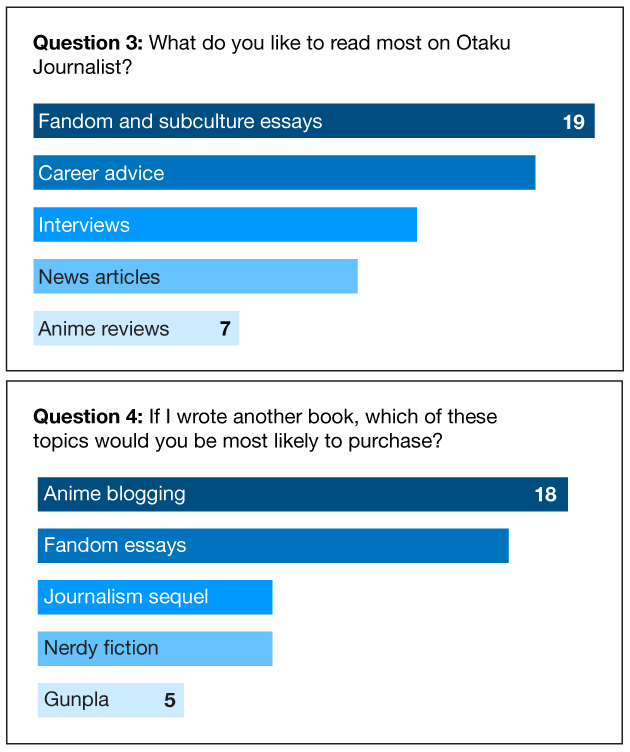Thanks for your patience today. I definitely did not plan this one out!
However, the survey itself was really neat. I’m really grateful to everyone who filled it out. So let’s take a look at some analysis!
First of all: the turnout. Forty-seven people took the survey. On a conservative estimate, 400 people visit Otaku Journalist every day. So that means a little more than 10 percent of visitors took the survey. That’s pretty good—I know you guys are just as busy as I am. I also appreciate that so many of you took it without entering the giveaway, which I guess means you already own the book, but wanted to do me a favor anyway!
Still, I will keep in mind that this is only how ten percent of you feel about Otaku Journalist, so I’m not going to revamp the entire site based on the survey results or anything! Onto the questions:
Questions 1 and 2: How did you find Otaku Journalist/ How long have you been reading?
These were some illuminating answers. I’ve long suspected that my audience is newer to the blog than I thought (I mean, it is bigger now), but this confirmed it. The majority of respondents by a wide margin said they’ve been reading for “a couple of months.”
“Where did you find me” was more predictable. Obviously, most people ended up here from much larger sites I’ve written for/been featured on, like Reddit’s r/anime, Susannah Breslin’s Forbes blog, and Crunchyroll. Many also found me through Big Names in Anime, like Lynzee Lamb of Anime News Network or one of Anitwitter’s usual suspects.
Questions 3 and 4: Favorite topics on the blog or in potential books?
Built some graphs to illustrate these two. These are only the “VERY YES” responses—I wanted to map which topics people are most enthusiastic about:
This is much more level than I thought it would be. I predicted that you guys would be downright sick of my journalism/freelancing career advice by now, but I guess it’s helpful. I will certainly make an effort to write more personal essays about my life and work in fandom and subculture—and maybe even publish an ebook of longer ones. I hope this means people are also interested in guest posts that take personal essay form, because I love posting those.
As for books, well, I just like working on big projects. When I’m ready to begin writing the next one, looks like now I’ve got some ideas about where to start.
Question 5: Comments or critique about Otaku Journalist?
I’m so glad I kept this survey anonymous because I suspect I got a lot more honesty on this answer than I would have otherwise. It was very helpful to hear.
Some things you love:
- Overall, you seem to like that I’m honest and relatable, and I am so glad to hear you think so. No matter how old this blog gets or what opportunities come into my career, I want you to always be able to think of me as a potential friend.
- A lot of people stressed that their favorite posts were technical articles that share and instruct on concrete anime journalism and blogging skills, like for interviews and reviews. I’ll be sure to write more on that topic, but I’m wondering why you guys aren’t buying the book, which is all about that stuff. Is it too expensive?
- It makes me happy that several of you pointed out some of my opinions that you disagreed with, but still liked that I wrote those opinion pieces in the first place. I don’t always expect us to agree, but I hope my opinions can keep sparking conversation.
Some sore spots:
- Several of you asked me to be maintain more of a critical distance from anime fandom, and to be more transparent when a post is my own opinion instead of a formal critique. It’s easy to shy away from controversial topics in fandom (stuff like moe and anything beyond armchair feminism), but I am a professional journalist, and maybe it’s time to talk.
- The comment system is kind of crap. I mean, I’ve known about this for a while, and John is always on my case to switch to LiveFyre or Disqus. This will also make it easier for me to participate more in the comments, like some of you asked.
And finally, the moment you’ve been waiting for. There were 21 giveaway entries, and though they are not numbered, I’m counting from oldest (top of the list) to newest as 1 to 21. I used Random.org to generate the result:
And the winner is, number 6: Kyrant! Kyrant, I’ve emailed you but if you haven’t gotten it yet, feel free to send me a note.
Once again, thank you to everyone who filled out the survey. It may have seemed like a small gesture, but it’ll go a long way when I’m making decisions for the future of this blog, from design choices to what I’m going to write about next.





